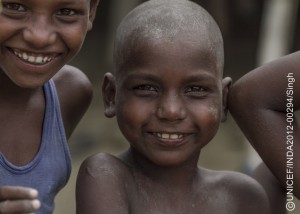On Universal Children’s Day, look to the future, says UNICEF By 2050, one in three children will be born in Africa
2012-11-20
NEW YORK/ HONG KONG, 20 November 2012 – On Universal Children’s Day, UNICEF issued a new research paper highlighting global demographic shifts forecast for the coming generation of children that present major challenges to policy makers and planners.
| The paper for instance says that by 2050 one in every three births will be African – as will also be almost one in every three children under the age of 18. One hundred years earlier, sub-Saharan Africa’s share of births was just one in 10. The paper, Generation 2025 and beyond: The critical importance of understanding demographic trends for children of the 21st century, says that in turn under-5 deaths will continue increasingly to be concentrated in sub-Saharan Africa, in pockets of poverty and marginalization in populous lower-income countries and in least developed nations. “What is important is whether the world as it prepares for the post-2015 agenda takes account of this fundamental and unprecedented shift,” said co-author UNICEF’s David Anthony. “We must do everything possible so these children get an equal chance to survive, develop and reach their full potential.” |
 |
The paper projects only a modest four per cent increase in the global population of children by 2025, but the population growth shifts significantly to countries in the South.
According to projections, the 49 countries classified as the world’s least developed nations will account for around 455 million of the 2 billion global births between 2010 and 2025. Five populous middle income countries – China, India, Indonesia, Pakistan and Nigeria – will account for about 859 million births between 2010 and 2025.
 |
 |
Though China and India will continue to have a major share of the world’s population, in absolute terms Nigeria will see the highest increase in its under-18 population of any country, adding 31 million children, a rise of 41 per cent, between 2010 and 2025. At the same time, Nigeria will account for one in every eight deaths among under-18s.
The paper says policy implications of the shift of child population and child deaths to the world’s poorest and most populous countries are key. For least developed countries, serious consideration must be given to how to meet the needs of children, especially in health and education.
The study, derived from projections by the United Nations Population Division, says the ageing population globally will increase pressure to shift resources away from children.
 |
“Children do not vote, and their voices are often not heard when governments make decisions about funding,” said paper co-author Danzhen You from UNICEF. “So it will be more important than ever to safeguard children so their rights are respected and upheld.” The paper’s recommendations include: targeting investments to the areas where children will be born; an emphasis on neglected groups, especially in high population, middle income countries; reaching the poorest and most isolated households, and urgently tackling the issue of old age dependency. |









